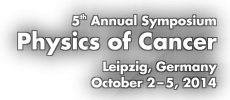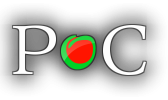|
|
The scientific program consists of
invited and contributed talks as well as a poster session. The detailed
web schedule including abstracts is available below.
Please, pay attention to last-minute rearrangements.
Additionally, all participant will receive a printed program booklet.
You may also download this program booklet as PDF
file.
Talks:
All talk sessions take place in the large auditory (ground floor, SR
1.1 to 1.3) of the Center for Biotechnology and
Biomedicine (BBZ). Contributed talks are allocated 15 min (including
discussion), whereas invited talks are allocated 20 min plus 10 min discussion.
Posters:
The session for poster presentation takes place in the foyer of the
Center
for Biotechnology and Biomedicine (BBZ). During this session, there
will be a snack buffet for all participants. The poster boards will be
marked with the number according to the scientific program. Posters must
fit within a rectangle 90 cm wide and 120 cm high (DIN A0), portrait format.
The material necessary to mount the poster (pins or "Poster Strips") will
be provided.

|
11:00 13:00
|
Conference check-in and on-site
registration |
|
13:00 13:15
|
Welcome and opening
Josef A. Käs (University of
Leipzig, Germany) |
| Session I: Mechanical properties of cancer cells I |
|
13:15 13:45
|
Mechanical
sensing by normal and transformed cells
Paul Janmey (University of Pennsylvania,
USA) |
|
13:45 14:15
|
Individual
and collective metastatic cell migration behaviors
Cynthia Reinhart-King (Cornell
University, USA) |
|
14:15 14:45
|
Applying
controlled mechanical pressure on tumor cells aggregates
Giovanni Cappello (Institut Curie,
France) |
|
14:45 15:15
|
Coffee break |
|
15:15 15:45
|
Mechanical
constraints and cancer
Daniel Fletcher (University of
California, Berkeley, USA) |
|
15:45 16:15
|
Early
changes in tissue organisation and structure in colorectal cancer
Inke Näthke (University of
Dundee, UK) |
|
16:15 16:45
|
Biomechanical
processes and topological dynamics in tumors
Lance L. Munn (Massachusetts General
Hospital & Harvard Medical School, USA) |
|
16:45 17:15
|
Caveolae-mediated
mechanotransduction in single cells and imaging of confined spheroids
Franziska Wetzel (Institut d'Optique
Graduate School, France) |
|
17:15 17:30
|
Biomechanics
of human primary tissue cells in tumor progression
Anatol Fritsch (University of Leipzig,
Germany) |
|
17:30 17:45
|
Cell
deformability during passage through micron-scale constrictions
Janina Lange (University of Erlangen-Nuremberg,
Germany) |
|
17:45 18:00
|
Epithelial
closure dynamics
Philippe Marcq (Institut Curie,
France) |
|
Evening
|
Enjoy the evening at your own disposal. |

| Session II: Membranes and the cytoskeleton |
|
08:30 09:00
|
Pulling with filopodia:
high forces on weak connections
Patricia Bassereau (Institut Curie,
France) |
|
09:00 09:30
|
Oncogenic signaling
and the cytoskeleton
David M. Helfman (KAIST, South
Korea) |
|
09:30 10:00
|
Mechanism of CD95
clustering and activation at the single cell level
Joel Beaudouin
(German Cancer Research Center & BioQuant,
Germany) |
|
10:00 10:30
|
Mimicking tissues
with densely packed lipid droplets
Jasna Brujic (New York University,
USA) |
|
10:30 11:00
|
Coffee break |
|
11:00 11:30
|
The mechanics of
invasion: How contraction sets the stage for invasive migration
Timo Betz (Institut Curie, France) |
|
11:30 12:00
|
Chemomechanics
of cell migration and activation in the cancer microenvironment
Krystyn J. van Vliet (Massachusetts
Institute of Technology, USA) |
|
12:00 12:30
|
Oncogenic cell
transformation changes the nanoscale organization of adhesions, vimentin
filaments and cell stiffness
Annica K. B. Gad (Karolinska Institutet,
Sweden) |
|
12:30 12:45
|
The role of
vimentin in cell migration under confinement
Luiza Stankevicins (Saarland University,
Germany) |
|
12:45 13:00
|
Cancer cell
behaviours on a culture substrate imprinted with their own features
Tiffany Tan (University of Otago,
New Zealand) |
|
13:00 14:30
|
Lunch |
|
Afternoon
|
Get-together with visit to the museum Zeitgeschichtliches
Forum (free admission).
For all invited speakers, there will be a guided tour starting at
16:00.
(Please note that October 3 is a national holiday in Germany. Hence,
most shops will be closed.) |
|
18:00
|
Motet at St. Thomas church (2.00 EUR admission).
Note that doors already open at
17:15. No reservations possible. Free admission for all invited
speakers. |
|
19:00
|
Dinner at "Auerbachs Keller" for all invited
speakers |

| Session III: Mechanical properties of cancer cells II |
|
08:30 09:00
|
Analysis
of a few in vitro experiments
Jacques Prost (Institut Curie,
France) |
|
09:00 09:30
|
Mechanotransduction
in developing cell systems
Kristian Franze (University of
Cambridge, UK) |
|
09:30 10:00
|
Association
between embryonic development and locoregional cancer progression
Michael Höckel
(University of Leipzig, Germany) |
|
10:00 10:30
|
Coffee break |
|
10:30 11:00
|
Biophysical
characterization of the myxobacterial compound Soraphen A: an innovative
option to fight invasive cancer
Angelika M. Vollmar (LMU Munich,
Germany) |
|
11:00 11:30
|
Actin-based
transport adapts polar cap size to local curvature
Daria Bonazzi (Institut Jacques
Monod, France) |
|
11:30 12:00
|
Modeling
glioma and targeting the glioma niche
Karin Forsberg Nilsson (Uppsala
University, Sweden) |
|
12:00 12:15
|
Is
cell segregation governed by cellular adhesion?
Steve Pawlizak (University of Leipzig,
Germany) |
|
12:15 12:30
|
Mesenchymal
migration cannot be described as a persistent random walk
Charlotte Riviere (Université
Lyon 1, France) |
|
12:30 14:30
|
Lunch break |
| Session IV: Microtools for study and diagnostics in
cancer research |
|
14:30 15:00
|
Measuring
cell mechanics for medicine
Dino Di Carlo (University of California,
Los Angeles, USA) |
|
15:00 15:30
|
Quantifying
metastasis using rare events
Timothy Newman (University of Dundee,
UK) |
|
15:30 16:00
|
Plasticity
of cancer cell migration: Extracellular matrix enables the optimisation
of blebbing, adhesions, and spreading
Melda Tozluoglu (University College
London, UK) |
|
16:00 16:15
|
New
elasticity-patterned substrates for bi-dimensional organization of cells
Camille Migdal (iRTSV, CEA Grenoble,
France) |
|
16:15 16:30
|
Emergence
of collective cell migration on circular micropatterns
Felix Jakob Segerer (Ludwig Maximilian
University of Munich, Germany) |
|
16:30 17:00
|
Coffee break |
|
17:00 17:30
|
Micromechanical
tools to study the role of vimentin in cells
Franziska Lautenschläger (Saarland
University, Germany) |
|
17:30 18:00
|
Role
of serum response factor in the mechanotransduction of myoblasts
Sylvie Hénon (Université
Paris Diderot, France) |
| Poster Session |
|
19:00 22:00
|
During the poster session, there
will be a snack buffet for all participants. |
|
01
|
Intracellular
stresses in patterned cell assemblies
Alice Nicolas (Université
Joseph Fourier, France) |
|
02
|
Modulation
of membrane rigidity impacts cell migration and invasion
Sebastian Schmidt (University of
Leipzig, Germany) |
|
04
|
The interactions
of hERG1 potassium channels and ß1 integrins in pancreatic ductal
adenocarcinoma cells
Stefano Coppola (Sapienza University
of Rome, Italy) |
|
05
|
Mechanical
cues in Ewing sarcoma metastasis
Elena Beletkaia (Leiden University,
The Netherlands) |
|
06
|
Plasma membrane
softening in human breast and cervical cancer cells
Chris Händel (University of
Leipzig, Germany) |
|
07
|
The native
root extract of Linum usitatissimum: stress fiber induction by increased
profilin-1 expression results in reduced motility of MCF-7 breast cancer
cells
Nadja Engel-Lutz (University Medical
Center Rostock, Germany) |
|
08
|
Mechanosensation
in Constrained Collagen Matrices
Hamid Mohammadi (University of
Toronto, Canada) |
|
09
|
Heterogeneity
and dynamics of cancer cells at the interface of step-gradients of 3D collagen
matrices
Jiranuwat Sapudom (University of
Leipzig, Germany) |
|
10
|
Biophysical
method for early cancer detection
Jelena Muncan (University of Belgrade,
Serbia) |
|
11
|
Contractile
actin bundle without molecular motors
Jörg Schnauß (University
of Leipzig, Germany) |
|
12
|
Control of
cancer cell invasion by lamin-mediated nuclear deformability
Katarina Wolf (Radboud University
Nijmegen Medical Centre, The Netherlands) |
|
13
|
Effect of
x-irradiation on cell morphology, cytoskeleton network, and adhesion
Sabato Fusco (Istituto Italiano
di Tecnologia, Italy) |
|
14
|
Intracellular
mechanics of normal and cancer cells
Jean-Baptiste Manneville (Institut
Curie, France) |
|
15
|
Higher ordered
assembly of rigid biopolymers induced by depletion forces
Martin Glaser (University of Leipzig,
Germany) |
|
16
|
Surface tension-based
model of epithelial folds
Matej Krajnc (Jozef Stefan Institute,
Slovenia) |
|
17
|
Mechanics
of tumor growth in an in vitro model system
Kristen Mills (Max Planck Institute
for Intelligent Systems, Germany) |
|
18
|
Building minimal
cells to understand cell shape control
Mulla Yuval (FOM Institute AMOLF,
The Netherlands) |
|
19
|
Cell motility
at the leading edge: Measuring membrane fluctuations with an optical tweezer
setup
Lippoldt Jürgen (University
of Leipzig, Germany) |
|
20
|
Mechanobiology
of cellular trafficking across membranes
Sabyasachi Dasgupta (Forschungszentrum
Jülich, Germany) |
|
21
|
Polymer Physics
2.0: Exploiting programmable nanomaterials to control material properties
of soft matter
Carsten Schuldt (University of
Leipzig, Germany) |
|
22
|
How biophysical
and nanomedical tools support therapeutical improvements in neurooncology
Ruiyan Zhang (Christian-Albrechts-Universität,
Germany) |
|
23
|
Models for
angiogenesis on microstructured surfaces
Simon Schuster (LMU Munich, Germany) |
|
24
|
Composite
networks of actin and intermediate filaments
Tom Golde (University of Leipzig,
Germany) |
|
25
|
Xenograft
draining lymph nodes have alterations within the structural reticular network
and collagen fibres
Freja Albjerg Venning (University
of Copenhagen, Denmark) |
|
26
|
Resolving
the mechanobiology of the epithelium on native basement membranes
Marija Plodinec (University of
Basel, Switzerland) |
|
27
|
Taking the
atomic force microscopy to the clinic: Predicting the prognosis and recurrence
of breast cancer by integrating the nanomechanical profiles of primary
tumor and its adjacent tissue
Ellen Obermann (University Hospital
Basel, Switzerland) |
|
28
|
Investigating
cell mechanics by atomic force microscopy
Alexander Dulebo (Bruker Nano Surfaces
Division, Germany) |
|
29
|
Cell deformability
during passage through micron-scale constrictions
Janina Lange (University of Erlangen-Nuremberg,
Germany) |
|
30
|
Epithelial
closure dynamics
Philippe Marcq (Institut Curie,
France) |
|
31
|
The role of
vimentin in cell migration under confinement
Luiza Stankevicins (Saarland University,
Germany) |
|
32
|
Cancer cell
behaviours on a culture substrate imprinted with their own features
Tiffany Tan (University of Otago,
New Zealand) |
|
33
|
Mesenchymal
migration cannot be described as a persistent random walk
Charlotte Riviere (Université
Lyon 1, France) |
|
34
|
New elasticity-patterned
substrates for bi-dimensional organization of cells
Camille Migdal (iRTSV, CEA Grenoble,
France) |
|
35
|
Emergence
of collective cell migration on circular micropatterns
Felix Jakob Segerer (Ludwig Maximilian
University of Munich, Germany) |
|
36
|
Dynamics and
heterogeneity in tumor cell migration
Christoph Mark (University of Erlangen-Nuremberg,
Germany) |

|
|


